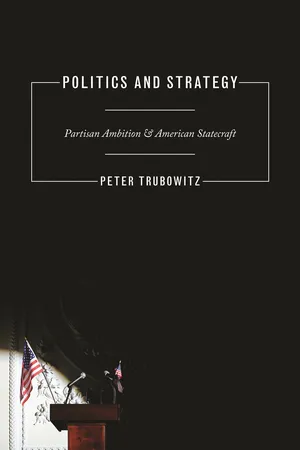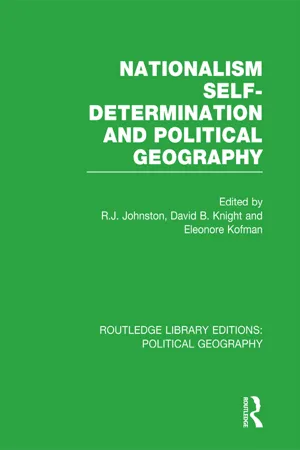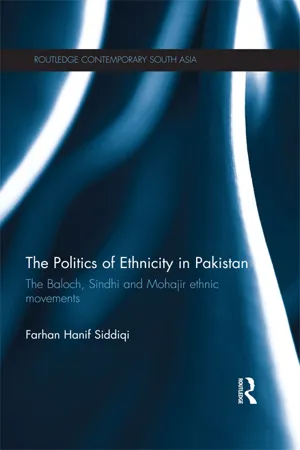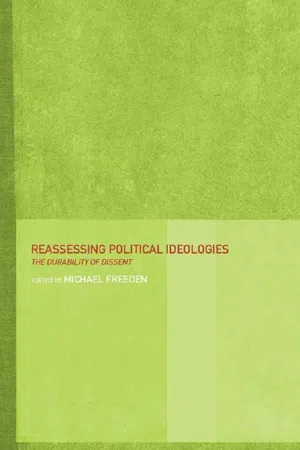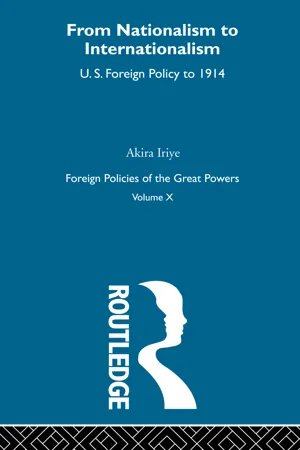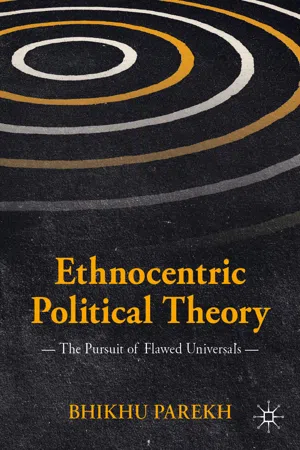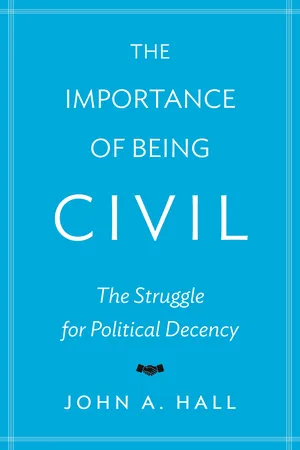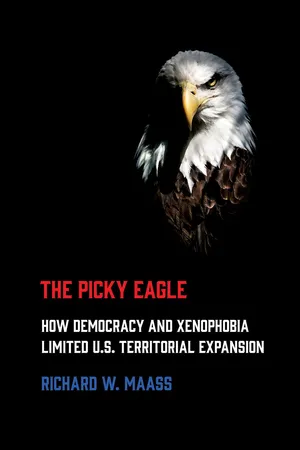Politics & International Relations
Expansionist Nationalism
Expansionist nationalism refers to a political ideology that advocates for the expansion of a nation's territory, influence, or power. It often involves the belief in the superiority of one's own nation and the desire to assert dominance over other nations through territorial expansion, colonization, or military conquest. This ideology has historically led to conflicts and imperialism as nations sought to expand their borders and influence.
Written by Perlego with AI-assistance
Related key terms
8 Key excerpts on "Expansionist Nationalism"
- eBook - ePub
Princeton Studies in International History and Politics
Partisan Ambition and American Statecraft
- Peter Trubowitz(Author)
- 2011(Publication Date)
- Princeton University Press(Publisher)
CHAPTER FOUR When States Expand W HY DO STATES SEEK TO EXPAND their political influence abroad? Realists of various persuasions argue that the explanation lies in the international system and the uncertainty its anarchical structure creates for statesmen. As a state’s power (meaning its material resources) relative to that of other nations increases, so will its desire to extend its political influence and control internationally—to do what it can, militarily, economically, and diplomatically to enhance its security in an uncertain world (Krasner, 1978; Gilpin, 1981; Zakaria, 1998). Robert Gilpin (1981, 94) calls this the “realist law of uneven growth” and argues that it is the central dynamic of international politics. In order to increase their own security, growing states will actively seek to change their international environment in ways that will offer them greater political, economic, and territorial control. In the realist model, expansionism has little to do with leaders’ own political ambitions, or with the interests of their partisans. Leaders expand abroad because they can and when they can, not when it pays domestically for them to do so. T HEORIES OF E XPANSIONISM In this chapter, I argue that foreign ambition cannot be easily divorced from leaders’ political self-interest. Expansionist foreign policies aim at extending a nation’s geopolitical reach and political control beyond its borders. These efforts can take the classic form of imperial conquest and subjugation of foreign peoples, but there are also other, less formal methods of expansion. Leaders can create protectorates, annex contiguous territories, build military bases, or establish spheres of influence. I argue that leaders are mostly likely to pursue such expansionist goals when they enjoy geopolitical slack and when expansionism pays domestically. I show that increased military power does give leaders greater flexibility or latitude in deciding where and how to use that power - R. J. Johnston, David Knight, Eleonore Kofman(Authors)
- 2014(Publication Date)
- Routledge(Publisher)
248). It is increasingly recognised that nationalism is a political principle, that its ability to achieve its objectives involves practical politics (see Hedges chapter 7), and that the constituent cultural elements are not given and fixed for all time. For example, Basque nationalism has shifted from the primordial basis of its earliest form at the end of the nineteenth century to a more territorial form in its recent manifestations (Linz, 1985). The political translation of aspirations can also be clearly seen in demands for self-determination, defined as the ‘right of a group with a distinctive politico-territorial identity to determine its own destiny’ (Knight, 1984). As both Cobbah (chapter 5) and Knight (chapter 8) stress, it is very difficult for minority groups to bypass the jurisdiction of an existing state, and thus to “dismember or impair, totally or in part”, the existing state (United Nations Charter, quoted by Knight, chapter 8). What has been done in the process of colonisation, cannot easily be undone through decolonisation. The political implications of nationalism in a global system of states have made it virtually impossible for nationalism to be conceived as cultural autonomy in the way that, for example, Otto Bauer had advocated at the beginning of the twentieth century for minorities in the Habsburg Empire (Burghardt, chapter 4 ; Munck, 1986 pp. 39–41). Typologies of nationalism have generally focused on the presence or absence of a state and whether the nation has still to be constructed. A.D. Smith (1971) has produced a division into pre- and post-independence, while Breuilly (1982) situates nationalist movements historically, in a world either without or of states. What is most significant nowadays is that the state is the accepted model of territorial organisation and the key determinant in the world political map- eBook - ePub
The Politics of Ethnicity in Pakistan
The Baloch, Sindhi and Mohajir Ethnic Movements
- Farhan Hanif Siddiqi(Author)
- 2012(Publication Date)
- Routledge(Publisher)
First, emotions or emotive appeal are context dependent. Political mobilisation within an ethnic group is not a function of emotions as emotions are not a cause but an effect. The cause of heightened emotions are related to conditions of domination, neglect and isolation which an ethnic group perceives subjectively (which Connor ignores) and then embarks upon creating a political voice in response to such conditions. When the political voice gains momentum, emotions related to group feelings of unity based on common descent, kinship and blood ties etc., are consequently aroused. Thus, it is not emotions which dictate political mobilisation, it is the political conditions which intensify emotions and lead to the creation of an ethnopolitical movement. It is safe to assume that as citizens of the modern nation-state, all ethnic groups are affected by decisions of the central decision-making authority and that such decisions have a significant effect in both attenuating as well as intensifying the feelings of ethnonationalism.Second, a more powerful and persuasive explanation of the rise of nationalism in both the developed and developing world has to do not with the emotive appeal of ethnonationalism, but rather its ideological prowess as a doctrine of resistance authenticated and legitimated by the international community and exemplified in President Woodrow Wilson’s Fourteen Points.17 In the twentieth century, and especially since the First World War, the idea of nationalism and national self-determination spread into every nook and cranny of the world engendering an incipient basis of anti-colonial nationalism which brought down colonial powers and their rule.18 Nationalism, according to such an interpretation, then qualifies as an ideology of resistance or as a legitimate organising principle of politics which nations and ethnic groups espouse in order to claim rights and thwart oppression. In the words of Benedict Anderson:The reality is quite plain: the ‘end of the era of nationalism,’ so long prophesied, is not remotely in sight. Indeed, nation-ness is the most universally legitimate value in the political life of our time.19Nationalism as an ideology and political principle in the developing world came primarily through the colonial state. This subject is an important part, yet unfortunately, an understated strand of a brilliant work on nationalism by Benedict Anderson. The most profound and the most commented on, debated and analysed bit concerns Anderson’s emphasis on the rise of modern industrial technology (capitalism), its associated industry relating to vernacular press (print-capitalism) and through the latter the eradication of communication barriers between people living within a territory. The Enlightenment, according to Anderson, played a key role in the development of nationalism, as ecclesiastical authority lost its hegemony which signalled the collapse not only of religion but also of its associated language, Latin. The Latin language was now replaced with a vernacular language and coupled with the rise of print-capitalism it heralded the rise of nationalism as communication barriers broke down and people began to ‘imagine’ themselves as a nation. According to Anderson, the driving classes behind nationalism were the educated bourgeoisie who ‘were the first classes to achieve solidarities on an essentially imagined basis’.20 - eBook - ePub
Reassessing Political Ideologies
The Durability of Dissent
- Michael Freeden, Michael Freeden(Authors)
- 2004(Publication Date)
- Routledge(Publisher)
However, two additional factors in recent years have highlighted the profile of nationalism in contemporary politics. Paradoxically, most current positive claims for nationalism now acknowledge that it embodies a cluster of perspectives. In this sense, it is accepted by most proponents of twentieth-century nationalism that there are ideological variations, both civic and liberal-minded as well as racist, insular and bellicose forms. These complex variants were not envisaged by the early- to mid-nineteenth-century ideologists of nationalism. Thus, nationalist ideology in the twentieth century appears as a much more varied and complex pattern of thought than previously imagined. Secondly, many have also seen a link between forms of nationalism and liberal ideological values like freedom, democracy and popular sovereignty. Consequently, since the collapse of the Berlin wall in 1989, and the changing political landscape of international and domestic politics, there has been once again a surge of theoretical and practical interest in nationalism in the Western academic environment. Not only are vast amounts being written about it, from both empirical and ideological perspectives, but it has once again become a central player in world politics. The fundamental flaw and problem in this post-1989 post-communist interest in nationalism is that very little of it has been civic or liberal in practice. If anything, the bulk of the nationalism seen, for example, in Europe in the last decade has been quite markedly insular and deeply xenophobic in character. This historical practice thus runs totally contrary to much of the more optimistic liberal-minded academic writing about nationalism.However, this is but one of a number of deep paradoxes running through nationalist ideology in the twentieth century. Historically, nationalism is a comparatively recent historical phenomenon. Conversely, one of its central substantive claims has been its longevity and antiquity. Further, nationalists often identify the roots of nationalism within nature. This arises out of the semantics of the word nation. Yet it is clear from even the most cursory study of the subject that nationalism is a comparatively modern artefact. In fact, for some, nationalism equates with modernity. It is largely a phenomenon of the late nineteenth and twentieth centuries. In addition, nationalism is in the peculiar position of claiming a universality for its ideas, yet the ideology only makes sense in terms of its particularity and localism. Finally, and most significantly, there is the problem of, on the one hand, the immense power of nationalism in this and the last century in the actual practice of politics, coupled with, on the other hand, nationalism's oft remarked theoretical naivety. These paradoxes appear throughout this essay. - eBook - ePub
- Akira Iriye(Author)
- 2013(Publication Date)
- Routledge(Publisher)
Chapter 3The Growth of Nationalistic Expansionism
In 1889 American diplomacy could still be characterized as traditional; it was primarily concerned with national security and the protection of economic interests. They comprised the national interest within fairly clearly defined limits. For over twenty years the country had not acquired additional territory, although this was the time when the European powers were vying with one another to extend their control over distant lands. On the other hand, there was some sense of uneasiness as Americans viewed themselves and the world and saw things happening that did not entirely accord with their customary perceptions of international affairs. The bulk of the population remained complacent and provincial, but various writers were no longer certain that familiar concepts like civilization and progress sufficed as a vocabulary to describe the rapidly changing events in the world.Within ten years much changed. The United States joined the ranks of imperialist countries, with new overseas possessions and bases, and it considered itself a major world power. Domestically, there was renewed optimism that the nation was at last asserting its vital energies outward, instead of intensifying social strife at home. At the same time, opponents of the new departure engaged its supporters in a fierce debate. National opinion was never united, but at least there was a nationwide debate on foreign policy questions for the first time since the 1840s.The story of this transformation is a fascinating one, and historians have dealt with it in various conceptual frameworks. Some of their interpretations will be noted in proper places. But the real measure of the change can be taken only if one viewed the 1890s by applying to it the same analytical framework as to the preceding decades. Here, therefore, we shall look at United States relations with various parts of the world after 1889 in terms of the ingredients mentioned earlier, always keeping in mind the question of comparison with the diplomacy of the European powers. - eBook - ePub
Ethnocentric Political Theory
The Pursuit of Flawed Universals
- Bhikhu Parekh(Author)
- 2019(Publication Date)
- Palgrave Macmillan(Publisher)
© The Author(s) 2019 Bhikhu Parekh Ethnocentric Political Theory International Political Theory https://doi.org/10.1007/978-3-030-11708-5_14Begin Abstract14. Ethnocentricity of the Nationalist Discourse
Bhikhu Parekh1(1) Politics and International Relations, University of Hull, Hull, UKBhikhu ParekhEnd AbstractKeywords
State Nationalism Forms of non-Western nationalismThe first half of the nineteenth century marked the emergence of a new mode of political discourse, and gave rise to such political doctrines as liberalism , conservatism, socialism, anarchism and nationalism . Of these, nationalism , which is logically different from the others, has proved the most elusive and difficult to define. We have a reasonably clear idea of who is a liberal, a conservative or a socialist, or at least what their basic moral and political commitments are. We are not sure what nationalism stands for and disagree about its origins, paradigmatic examples, nature, variety and content.1For some commentators nineteenth-century German writers such as Fichte, Herder and Schleiermacher are the true nationalists2; for some others France is the birthplace of nationalism and Rousseau is its first theorist.3For some, nationalism is a political doctrine about how states should be organised4; for some others it is synonymous with collective egoism5; for yet others it refers to a determined attempt by a country to guard its distinct identity against external influences. Again, for some commentators, nationalism refers to the love of one’s country and its way of life and is synonymous with patriotism6; for some others, it is an exclusive and aggressive form of patriotism7; for yet others it is a wholly different kind of sentiment.8Thanks to these and related disagreements, the discussion of nationalism lacks clarity and focus and leads to the blurring of important distinctions. We forget that one might glorify the state but not the nation (Hegel ), the nation but not the state (Herder ), both at different levels (Fichte ), society and neither the state nor the nation (Rousseau ) or race but none of the other three (Gobineau). We also promiscuously combine the term nationalism with several others in such expressions as cultural, religious, linguistic, ethnic, civic and territorial nationalism , without asking if the term rightly applies to them and what it is supposed to convey. Since much of the nationalist discourse originates in and concentrates on the West, especially Europe, there is a tendency to universalise the European experience, and imagine that nationalism - eBook - ePub
The Importance of Being Civil
The Struggle for Political Decency
- John A. Hall(Author)
- 2013(Publication Date)
- Princeton University Press(Publisher)
CHAPTER 10 Imperialism, the Perversion of Nationalism John Hobson’s celebrated Imperialism: A Study begins with striking thoughts about the relationships between nationalism and imperialism. The novelty of the recent Imperialism regarded as a policy consists chiefly in its adoption by several nations. The notion of a number of competing empires is essentially modern. The root idea of empire in the ancient and medieval world was that of a federation of States, under a hegemony, covering in general terms the entire or recognized world, such as was held by Rome…. Thus empire was identified with internationalism, though not always based on a conception of equality of nations … the triumph of nationalism seems to have crushed the rising hope of internationalism. Yet it would appear that there is no essential antagonism between them. A true strong internationalism in form or spirit would rather imply the existence of powerful self-respecting nationalities which seek union on the basis of common national needs and interests…. Nationalism is a plain highway to internationalism, and if it manifests divergence we may well suspect a perversion of its nature and its purpose. Such a perversion is Imperialism, in which nations trespassing beyond the limits of facile assimilation transform the wholesome stimulative rivalry of varied national types into the cut-throat struggle of competing empires. 1 There is much to praise here. The ideal typical empire, especially in premodern circumstances, sought to create a world all of its own, free from competitors. 2 Such empires were “multicultural” (perhaps at times even “multinational”) to a fault, bound to diversity by weakness, lacking means to indoctrinate and to homogenize into a single mold. Nationalism and imperialism were separated from each other, making any notion of intimacy between them ridiculous. “Recent” imperialism was indeed different, seeking, in different degrees, to homogenize different peoples into a singular identity - eBook - ePub
The Picky Eagle
How Democracy and Xenophobia Limited U.S. Territorial Expansion
- Richard W. Maass(Author)
- 2020(Publication Date)
- Cornell University Press(Publisher)
In this way U.S. leaders pursued annexation throughout the nineteenth century by picking and choosing from among their potential options until they ran out of desirable targets. Congressional majorities supported presidential efforts to annex areas like Louisiana and California, but they delayed similar efforts in Florida and Texas and defeated efforts to gain more of Mexico and Cuba. Time and again they raised objections to the domestic costs of annexation, and as they crossed their remaining neighbors off their list of viable targets, the practice gradually disappeared from U.S. foreign policy. To recognize that annexation has domestic consequences and that those consequences bear on leaders’ decision making is to recognize that in international politics, as in the human diet, you are what you eat. And the United States has always been a picky eater.What Is Annexation?
Like many terms, “annexation” has often been used in vague and contradictory ways. In this book, consistent with its dictionary definition, annexation refers to the absorption of territory into a state. The most straightforward way to think about annexation is as a subset of territorial expansion, which is itself a subset of the expansion of international influence (table 1.1 ). Expansionism, or states’ pursuit of influence abroad, has attracted consistent interest from international security scholars due to its role in causing wars and shaping the international system.2 While most forms of expansionism simply aim to increase one state’s leverage over another’s policies, territorial expansion sees a state claim Westphalian sovereignty over an area beyond its previous borders, declaring itself to be the highest political authority there and proscribing foreign interventions.3 Territorial expansion may increase the state’s economic and military power more efficiently than other forms of expansionism—depending on its administrative and technological abilities to utilize its new territory—which explains why it is simultaneously a coveted foreign policy goal and a potent source of international conflict.4Territorial expansion, in turn, comes in two forms, annexation and imperialism, distinguished by whether the state fully absorbs its new territory or rules it separately and subordinately. A state in international relations, as opposed to U.S. states, is an institutional order that exercises paramount political authority and a monopoly on legitimate violence within its borders.5 Annexation expands that order by integrating new territory within its core protective, extractive, and legislative institutions. This doesn’t mean that states are internally homogeneous—no state entirely is—but rather that a state’s relationship with the annexed territory comes to mirror its relationship with its other constituent territories. By merging the new territory into the state itself, annexation enables leaders to redefine their national homeland, molding local identities, institutions, and cultural politics to reduce the likelihood of future unrest and maximize deterrent credibility in the eyes of international rivals who might desire to gain that territory for themselves.6
Index pages curate the most relevant extracts from our library of academic textbooks. They’ve been created using an in-house natural language model (NLM), each adding context and meaning to key research topics.
